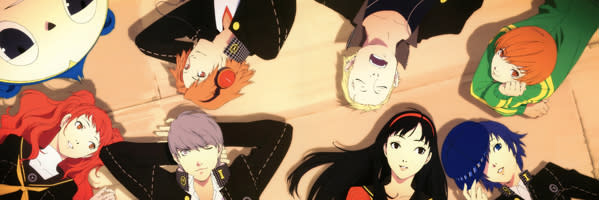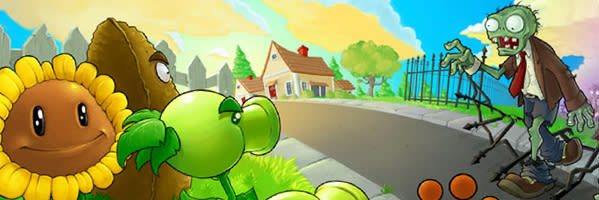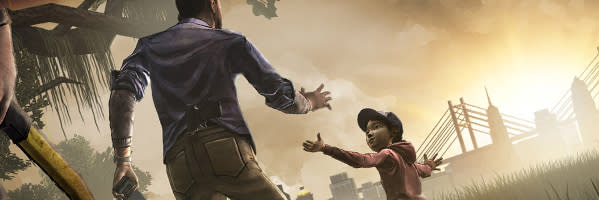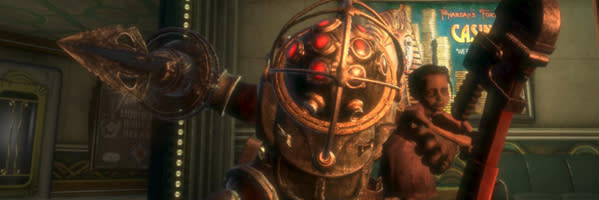10 Years, 10 Great Games: Susan's picks
Throughout the week, Joystiq celebrates its tenth anniversary by revealing each writer's favorite - not "best" - games of the last decade. Aside from selecting a number one, each list is unordered.
Joystiq Managing Editor Susan Arendt marvels at sentient bear suits with her pick, one of Atlus' most beloved RPG titles.

Shin Megami Tensei: Persona 4 – Atlus / 2008
When someone expresses interest in JRPGs and asks where they should begin, this is where I point them. Each element of Persona 4 – the visuals, soundtrack, story, combat mechanics, pacing – is handled perfectly, but when combined they achieve a brilliance that is rarely managed in games featuring sentient bear suits. At first glance, Persona 4 is just another amalgamation of JRPG tropes, with high school kids saving the world, bright colors and bizarre enemies, but at its heart lies something much more mundane – the everyday fears of becoming an adult.
The game's young heroes struggle not just with exotic foes ripped from nightmares, but with questions of familial responsibility, sexuality, personal identity and life goals. Mastering Persona 4 requires achieving a balance between honing combat skills and social life – level up your armor all you like, but you won't get far unless you're keeping up with your homework, too. Every day really is great at your Junes. (Note: Persona 4 Golden is considered a re-release and therefore was not eligible for this list, but it's really the better version.)

Plants vs. Zombies – PopCap / 2009
Bejeweled may have brought PopCap to prominence as the company that elevated the art of making casual games, and Peggle may have broken the ice with the core gaming audience, but Plants vs. Zombies was the perfect storm of creativity, accessibility and addictive gameplay. The ingenious concept of garden staples fending off hordes of the undead introduced tower defense to an entirely new audience while also enchanting those familiar with the genre. It wasn't just funny and cute, though, it was also a really solid game, allowing for all manner of strategies and play styles. (Personally, I'm a big fan of melon-pults and cob cannons. Put them with tall-nuts and call it a day.) It's not the hardest game to beat, but every playthrough is fun. I will never stop chuckling at the newspaper zombies. Never.

Elder Scrolls IV: Oblivion – Bethesda Game Studios / 2006
Ok, look. The main quest is pretty lame, the entire game has about five voice actors, and the people of Cyrodiil are oddly obsessed with mud crabs. This is all true. The world of Oblivion is flawed, and yet I spent hundreds of hours there, content to simply wander the countryside, engaging in whatever adventure came my way. Oh, look, a cave. I wonder what's inside! Bandits, perhaps, or a lost treasure OH GOD IT'S A TROLL. There was so much to discover in Oblivion that even running away from a ridiculously overpowered troll could lead to something exciting – a new ruin, or journal, or maybe an artifact tied to the gods. It was a beautiful world, too, with each region's architecture reflecting differences in tastes and cultures, and rich color everywhere you looked. It's fair to say that Oblivion wasn't quite as good as Morrowind in some ways or Skyrim in others, but I was perfectly happy to put up with mechanical awkwardness in exchange for the opportunity to simply live in that land. Really sorry about killing that unicorn, though. Seriously, I didn't know.

Mass Effect 2 – BioWare / 2010
One of the greatest game intros of all time leading into one hell of an assignment: a suicide mission to stop the Collectors and maybe, in the process, save the universe. Mass Effect 2 had the usual BioWare staples of memorable characters and outstanding writing, but it included intriguing game mechanics to back up the fantastic story. Side missions weren't there just to pad game time, but increase your crew's loyalty and bolster your ship's defenses. Suddenly the RPG elements felt like they had purpose beyond enhancing the role play as those conversations with your shipmates improved your chances of living through your final showdown on the other side of the Omega-4 Relay. Mass Effect 2 proved that you could tell an affecting tale without sacrificing the adrenaline rush of a fantastic action game; I managed to make it through the final suicide mission nearly unscathed, losing just one team member – my absolute favorite, Dr. Mordin Solus. I could've simply reloaded the game and tried again, but I felt like that would reduce him to something less than he was. He wasn't data to manipulate, he was an odd and delightful genius with an uncomfortable past and a fondness for show tunes. Now, years later, when I look back on the Mass Effect trilogy, that moment is still what comes to mind first.

The Walking Dead: Season One – Telltale / 2012
The Walking Dead is not a happy game. It is not a game in which you feel powerful or heroic. It is a game in which you feel as though you are one wrong decision away from complete destruction, just barely scraping through one mishap before you're thrust into the next, sacrificing much to gain little. It's depressing and tragic and just as you're wondering what the point is, you meet a young girl named Clementine, and you re-find your humanity. The Walking Dead is a typical adventure game in many ways, but its exceptional storytelling and characterization elevated the experience of playing above its point-and-click mechanics. Protagonist Lee was as concerned about being a good role model as he was keeping Clem out of harm's way - a tricky balance when surrounded by the undead. An art style that echoed the comic book source material and an outstanding voice cast helped carry the game's story across its five brief episodes, breaking our hearts a little more with each passing chapter.

Psychonauts – Double Fine / 2005
Psychonauts is one seriously messed up idea after another, held together by whip-smart writing, outstanding voice work and super-stylish visual design as young Raz rescues his fellow campers from Coach Oleander. It's pretty appropriate that a game whose core gimmick involves exploring the minds of its character ends up being so incredibly memorable. There's the giant Lungfish (named Linda, because of course), the bull running through Black Velvetopia, the Milkman (I hear his milk is delicious), the masters of disguise G-men and all the other delightfully bizarre, hilarious characters populating Whispering Rock Psychic Summer Camp. It maybe had a few too many collectibles and the less said about The Meat Circus, the better, but Psychonauts didn't need to be perfect to be one of the best games of the past decade. It's just so damn weird in such great ways, that you laugh and shake your head in bemusement with each fresh quirk. And that is the purpose of the goggles.

Dance Central – Harmonix / 2010
With all due respect to other dance games, if you're not moving your feet, you're not really dancing. Dance Central's ability to track players' legs and feet via Kinect has always made it a more challenging and satisfying dance experience, and each new entry in the series has refined the formula to make it increasingly more welcoming and fun. Get your friends together and shake your collective money makers, or keep it solo and put the effort into honing your booty-moving craft. If you've got all the rhythm of a sneaker in a washing machine, the game will teach you the moves one by one so that you're boogying like a pro in no time. You can be seriously swank or just groove like a doofus – Dance Central will always be proud to meet you on the dance floor. Moving to music is one of life's great pleasures, something Dance Central has always understood.

BioShock – Irrational / 2007
The descent into Rapture. The Big Daddies. Sander Cohen. The soundtrack. The big reveal. The ending ... ok, well, maybe not the ending. That was kind of terrible. But everything else about BioShock was nearly painful, it was so beautiful. I return to BioShock again and again simply so that I can spend just a little bit more time in the ruined city of Rapture, a fallen utopia brought down by the weight of its ambition. Well, that and its underestimation of the fallibility of mankind. Even when our goals are noble, we kind of can't help but screw everything up, and the denizens of Rapture make the most terrifying and fascinating mess of things. The art deco landscape, rich with blue and green hues, feels cool and claustrophobic, a fitting locale for residents trapped within themselves as the tunes of artists like The Ink Spots and Django Reinhart provide a refined backdrop for inhuman chaos. Audio diaries can feel like clumsy ways of dumping story points, but BioShock's told the real story of Rapture's doomed citizens – including idealistic leader, Andrew Ryan – in small, intimate ways. (Poor Masha.) Broken though it was, Rapture was a place I fell in love with and never really wanted to leave.

Device 6 – Simogo / 2013
Puzzle games are tricky, because the kinds of players who tend to like them also tend to play all of them, and so they can begin to feel very, very stale. Device 6 wasn't just a breath of fresh air, it was an entirely new atmosphere. Designed to take full advantage of the touch and gyro capabilities of tablets and smartphones, it delivered a head-warping take on the puzzle genre, putting a modern twist on 60s-era spy paranoia. The puzzles were mostly just code breaking, but the way they were presented, with text sliding across the page or sound cues only activating when you used the touch controls to swish past a certain point, made them feel utterly new. Slick graphics, smart writing, an unnerving knack for creating unease, ingenious puzzles and one hell of a musical earworm made Device 6 unforgettable.

1 vs 100 – Microsoft Game Studios / 2009
There are basically two types of people in the world: Those who played 1 vs 100 and loved it, and those who never got the chance to try it. It was an incredibly ambitious and innovative quiz show on Xbox Live, with scheduled broadcasts, a live host and commercial breaks. Sadly, it was also kind of a technical nightmare and its constant issues wound up shutting it down after just a few seasons. If you got to take part during its short lifespan, though, you were in on some genuine fun.
It worked just like the TV game show of the same name: One lucky participant was chosen to be the One, while 100 others were selected to be The Mob. The rules were simple: use your controller buttons to answer a multiple-choice question correctly and you stayed in the game, answer incorrectly and you were out. The One and the Mob earned prizes – actual prizes like games and Microsoft points – the longer they stayed in the game. Part of the thrill was knowing that you might get chosen to participate, but even if you didn't, playing along in the audience was still a lot of fun. I actually made it into the Mob once and stuck it out long enough to earn an XBLA game (Banjo Tooie, maybe?). I'm a sucker for game shows, and getting to appear on one, even in Xbox Live avatar form, was genuinely exciting. There are so many great multiplayer experiences to be had in gaming, but nothing quite like 1 vs 100. If ever there was a game that needed to make a comeback, it's that one.
[Images: Atlus, PopCap, Bethesda, BioWare, Telltale, Double Fine, Harmonix, Irrational, Simogo, Microsoft]


